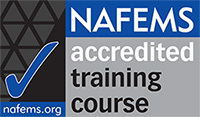
Introduction to Computational Fluid Dynamics Analysis (CFD): Theory and Applications
| Duration: | 2 days |
| Delivery: | Onsite Classroom
Public Classroom |
| Language: | English
German |
| Level: | Introductory |
| Availability: | Worldwide |
| Tutor(s): | Uwe Janoske |
| Request Full Details |
Get the correct guidance on how to understand CFD methods and techniques
This course offers excellent guidance on how to judge which numerical approximations are acceptable and appropriate for solving a wide range of practical problems. Of equal importance is the manner in which results are interpreted. Advice is provided which allows the correct decisions to be taken, based on results which are known to be reliable. Interaction is encouraged throughout the course, with the planning and design of a complete CFD project and examples of simple hand calculations, mesh designs and solution designs being set for the class to complete. The course is completely code independent.
All aspects of successful Computational Fluid Dynamics application are covered, including:
- The Finite Volume Method
- The computational mesh
- Turbulence
- Sources of error
- Interpretation of results
- Validation
Course Program
Part 1
- Introduction
- Examples of CFD Simulations / Advantages and Disadvantages of CFD
- Basics of Fluid Mechanics
- Basic Equations of Fluid Mechanics (Continuity, Momentum and Energy Equations)
- Introduction to Numerical Methods
- Mathematical Background
- Finite Volume Method
- Spatial Discretization
- Temporal Discretization
- Solution of the Navier-Stokes Equations (Pressure Correction)
- Grid Generation
- Solution of Systems of Linear Equations
Special flows
- Turbulent Flows
- Multiphase Flows
Part 2
Who Should Attend?
Practising engineers who wish to understand CFD methods and learn how to apply CFD techniques to their particular problems in the most effective manner.
Attendees should have a graduate engineering background including some knowledge of fluid dynamics and engineering mathematics
Interested?
Get in touch to discuss your next steps with our experienced training team. We can work closely with you to understand your specific requirements, cater for your specific industry sector or analysis type, and produce a truly personalised training solution for your organisation.
All NAFEMS training courses are entirely code independent, meaning they are suitable for users of any software package.
Courses are available to both members and non-members of NAFEMS, although member organisations will enjoy a significant discount on all fees.
NAFEMS course tutors enjoy a world-class reputation in the engineering analysis community, and with decades of experience between them, will deliver tangible benefits to you, your analysis team, and your wider organisation.
Find out more
PSE Competencies addressed by this training course



